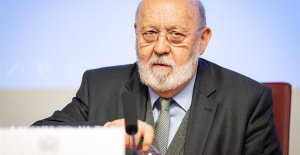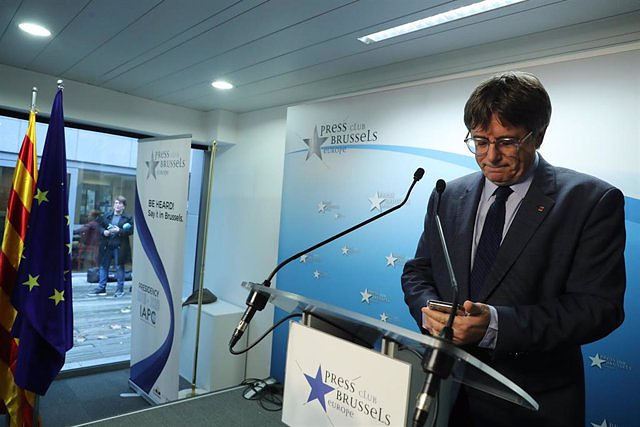Judges and magistrates may challenge the grace measure before the TC and the CJEU
MADRID, 31 Dic. (EUROPA PRESS) -
The main challenge that the courts will have in 2024 will undoubtedly be the application of the amnesty law agreed by the PSOE with Junts and ERC to erase the crimes committed within the framework of the 'procés', which will allow the return of the former president Catalan Carles Puigdemont and lift the disqualification that still weighs on his former vice president Oriol Junqueras. However, strong opposition is expected from judges and magistrates, who will fight in the CJEU and the TC.
The amnesty law, still in parliamentary process, covers more than a decade of 'procés', from January 1, 2012 - passing through the consultation of November 9, 2014, the referendum of October 1, 2017 and the riots unleashed in the fall of 2019 after the ruling of the Supreme Court (TS) that condemned the independence leaders-- until last November 13, when the text was released.
The bill, registered alone by the PSOE, passed its first examination in the Congress of Deputies on December 12. The most likely thing is that it will leave the Lower House around February to end up in the Senate, where it will be stranded for about two months, due to the reform carried out by the PP in the regulations of the legislative headquarters. It is estimated that by spring it will be definitively approved and come into force.
That will be when the machinery of Justice is activated. As established in the current text - which could be amended - it will be the judges and magistrates who have cases related to the 'procés' in their hands who will decide if it applies to them. To do so, they will have a "maximum period of two months" because the bill contemplates that these matters have an "urgent and preferential" nature.
The causes of the 'procés' are concentrated in the TS, where Junqueras and eleven other independence leaders were tried and sentenced to up to 13 years in prison and disqualification for crimes of sedition, embezzlement and/or disobedience; the Catalan courts, where the so-called minor charges of 1-O or the police are prosecuted; and the National Court (AN), which has sent the 12 CDRs of 'Operation Judas' to trial and is investigating Tsunami Democràtic.
Each of these judges and magistrates will have to study the impact of the amnesty in their cases and decide whether to apply it automatically or, if they believe that it conflicts with the Constitution or community norms, go to the Constitutional Court (TC) and/or the Court of Justice of the EU (CJEU) to clarify whether the law meets their respective standards.
In this second scenario, which is the one foreseen - according to the legal sources consulted by Europa Press -, the application of the amnesty will be paralyzed in cases whose judges and magistrates go to the TC and/or the CJEU until said courts issue their opinion. ruling, which will delay the materialization of the measure of grace for those involved in said cases. The Constitutional Court does not foresee that they can resolve within six months and the Luxembourg court usually takes a couple of years.
In addition to judges and magistrates, politicians will also be able to go to the TC. Those who have at least 50 deputies and senators may do so via an unconstitutionality appeal, which with the current parliamentary configuration reduces the list to the PP; and the governments and assemblies of the autonomous communities, from where movements are also predicted by the regions governed by the 'popular'.
However, unconstitutionality appeals do not cause the automatic suspension of either the amnesty law itself or its application to specific cases. To achieve this, those who challenge will have to expressly request it in precautionary measures that will have to be agreed upon by the court of guarantees.
Although the amnesty draft does not mention proper names, its main recipients are the leaders of the 'procés', both those who were convicted by the TS and those who remain on the run beyond the reach of the high court.
In the first group are Junqueras and former councilors Raül Romeva, Jordi Turull and Dolors Bassa, who were pardoned but remain disqualified for crimes of disobedience and embezzlement after the penal reform that repealed sedition and modified that second crime.
It will also affect Jordi Sànchez and Jordi Cuixart - convicted of public disorder -, the former president of the Parliament Carmen Forcadell and the former councilors Josep Rull and Joaquim Forn - convicted of disobedience -, although in their cases the penalties of disqualification that survived the pardons have already become extinct.
Regarding the fugitives, the amnesty will favor Puigdemont and former councilors Toni Comín and Lluís Puig, who are subject to a national arrest warrant for disobedience and embezzlement; to the general secretary of ERC, Marta Rovira, who remains in Switzerland prosecuted for disobedience and with the same order; and former counselor Clara Ponsatí, also prosecuted for disobedience but without a search and arrest warrant.
Aside from the questions that the Criminal Chamber of the TS may direct to the TC or the CJEU, the entry into force of the amnesty law will have the immediate consequence of annulling the national arrest warrants, so Puigdemont will be able to return. to Spain without being detained. On the other hand, Junqueras will not benefit from the new law until the Supreme Court decides on his case. At the moment, he is disqualified until 2031.
Another front from which the amnesty can be fought is the Court of Accounts (TCu), which has tried 35 former senior officials of the Generalitat, including Puigdemont, Junqueras and the also former Catalan president Artur Mas, for the alleged diversion of funds for 1-O expenses and foreign action framed in the 'procés'.
The Prosecutor's Office demands 3.1 million euros jointly and severally from the 35 defendants, while the Catalan Civil Society requests 5 million euros from 11 former senior officials.
During the trial, held on November 17, Junqueras and the other ERC defendants asked to suspend both the oral hearing and the accounting procedure due to the proposed law, something that the Prosecutor's Office opposed. Counselor Elena Hernáez rejected the first request but has yet to rule on the second.
The amnesty is also designed to free the 12 members of the Committees for the Defense of the Republic (CDR) that the AN has already sent to trial for membership in a terrorist organization for allegedly planning the assault and occupation of the Parliament of Catalonia and participate in road closures or raising toll barriers.
The law will affect another case investigated by the AN: the altercations allegedly orchestrated by Tsunami Democràtic after the sentence of the 'process', such as the attempted assault on the El Prat airport, the cutting of the Jonquera border or the repeated protests with barricades in front of the Police Headquarters in Via Layetana.
The investigating judge Manuel García Castellón asked the TS to investigate Puigdemont, Rovira and ten other people for a crime of terrorism. The Supreme Court's response is, precisely, one of the unknowns to be resolved this year. It will depend on where and under what terms Tsunami Democràtic continues to be investigated.
It is also still pending for the Criminal Chamber of the AN to resolve the appeal presented by the Prosecutor's Office against García Castellón's decision to direct the case against Puigdemont for terrorism. In the opinion of prosecutor Miguel Ángel Carballo, there is not enough evidence against the former president and the events would, at most, be a crime of public disorder.

 Exploring Cardano: Inner Workings and Advantages of this Cryptocurrency
Exploring Cardano: Inner Workings and Advantages of this Cryptocurrency Seville.- Economy.- Innova.- STSA inaugurates its new painting and sealing hangar in San Pablo, for 18 million
Seville.- Economy.- Innova.- STSA inaugurates its new painting and sealing hangar in San Pablo, for 18 million Innova.- More than 300 volunteers join the Andalucía Compromiso Digital network in one month to facilitate access to ICT
Innova.- More than 300 volunteers join the Andalucía Compromiso Digital network in one month to facilitate access to ICT Innova.-AMP.- Ayesa acquires 51% of Sadiel, which will create new technological engineering products and expand markets
Innova.-AMP.- Ayesa acquires 51% of Sadiel, which will create new technological engineering products and expand markets Marc Márquez returns to pole in Jerez
Marc Márquez returns to pole in Jerez The CIS carries out a quick survey on Sánchez's letter to measure the reaction of citizens
The CIS carries out a quick survey on Sánchez's letter to measure the reaction of citizens 12M.- Puigdemont to Sánchez and Illa: "This is not about the future of the PSOE! What have you believed?"
12M.- Puigdemont to Sánchez and Illa: "This is not about the future of the PSOE! What have you believed?" Díaz proclaims that "the Government is not going to bow down" and asks not to be "on the defensive and locked in" against the right
Díaz proclaims that "the Government is not going to bow down" and asks not to be "on the defensive and locked in" against the right How Blockchain in being used to shape the future
How Blockchain in being used to shape the future Not just BTC and ETH: Here Are Some More Interesting Coins Worth Focusing on
Not just BTC and ETH: Here Are Some More Interesting Coins Worth Focusing on UPV students build a prototype of a wooden house to move to Equatorial Guinea
UPV students build a prototype of a wooden house to move to Equatorial Guinea The UA opens the call for the Impulso 2024 Awards for the best innovative business initiatives
The UA opens the call for the Impulso 2024 Awards for the best innovative business initiatives ALI, virtual assistant from Alicante, internationally recognized by the OECD
ALI, virtual assistant from Alicante, internationally recognized by the OECD Retrópolis brings the golden age of video games and computing to the UPV
Retrópolis brings the golden age of video games and computing to the UPV A million people demonstrate in France against Macron's pension reform
A million people demonstrate in France against Macron's pension reform Russia launches several missiles against "critical infrastructure" in the city of Zaporizhia
Russia launches several missiles against "critical infrastructure" in the city of Zaporizhia A "procession" remembers the dead of the Calabria shipwreck as bodies continue to wash up on the shore
A "procession" remembers the dead of the Calabria shipwreck as bodies continue to wash up on the shore Prison sentences handed down for three prominent Hong Kong pro-democracy activists
Prison sentences handed down for three prominent Hong Kong pro-democracy activists ETH continues to leave trading platforms, Ethereum balance on exchanges lowest in 3 years
ETH continues to leave trading platforms, Ethereum balance on exchanges lowest in 3 years Investors invest $450 million in Consensys, Ethereum incubator now valued at $7 billion
Investors invest $450 million in Consensys, Ethereum incubator now valued at $7 billion Alchemy Integrates Ethereum L2 Product Starknet to Enhance Web3 Scalability at a Price 100x Lower Than L1 Fees
Alchemy Integrates Ethereum L2 Product Starknet to Enhance Web3 Scalability at a Price 100x Lower Than L1 Fees Mining Report: Bitcoin's Electricity Consumption Declines by 25% in Q1 2022
Mining Report: Bitcoin's Electricity Consumption Declines by 25% in Q1 2022 Oil-to-Bitcoin Mining Firm Crusoe Energy Systems Raised $505 Million
Oil-to-Bitcoin Mining Firm Crusoe Energy Systems Raised $505 Million Microbt reveals the latest Bitcoin mining rigs -- Machines produce up to 126 TH/s with custom 5nm chip design
Microbt reveals the latest Bitcoin mining rigs -- Machines produce up to 126 TH/s with custom 5nm chip design Bitcoin's Mining Difficulty Hits a Lifetime High, With More Than 90% of BTC Supply Issued
Bitcoin's Mining Difficulty Hits a Lifetime High, With More Than 90% of BTC Supply Issued The Biggest Movers are Near, EOS, and RUNE during Friday's Selloff
The Biggest Movers are Near, EOS, and RUNE during Friday's Selloff Global Markets Spooked by a Hawkish Fed and Covid, Stocks and Crypto Gain After Musk Buys Twitter
Global Markets Spooked by a Hawkish Fed and Covid, Stocks and Crypto Gain After Musk Buys Twitter Bitso to offset carbon emissions from the Trading Platform's ERC20, ETH, and BTC Transactions
Bitso to offset carbon emissions from the Trading Platform's ERC20, ETH, and BTC Transactions Draftkings Announces 2022 College Hoops NFT Selection for March Madness
Draftkings Announces 2022 College Hoops NFT Selection for March Madness























